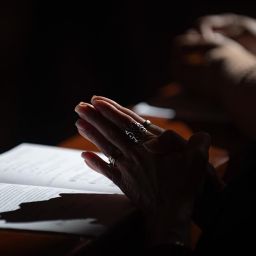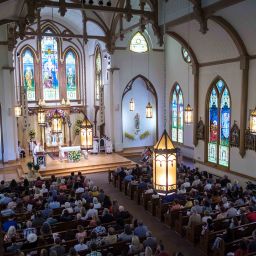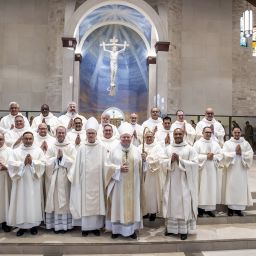By Father John Bayer, O. Cist.
Special to The Texas Catholic
Rod Dreher’s “The Benedict Option” (2017) has been on my list of things to read for a long time. As a Cistercian monk rooted in the Benedictine tradition and apostolically engaged as a priest and teacher, I basically felt like it was required reading, given how often people refer to it.
I finally read it, and I’m glad I did. Dreher helps his readers think through many important issues. I’ve seen critics accuse him of advocating an unevangelical withdrawal from the world, but I think he is far more sensitive and balanced than that.
His thesis presumes we are in a “post-Christian nation” and therefore must assume responsibility for cultivating a Christian culture. We cannot any longer (if we ever could) simply trust that mainstream or well-established institutions (e.g., political parties, conventional ministries and schools, professional guilds, new economies and technologies) will do this work for us. The culture is not Christian and will not mechanically help us to become so; it is in fact in various ways opposed to Christianity. We must, Dreher argues, therefore work diligently to rediscover “ways of thinking, speaking, and acting that incarnate the Christian in culture and pass it on from generation to generation” (236). Our happiness – the salvation of souls — depends upon our resolution “to grow in new life, nourished by the never-ending torrent of God’s grace” (238). For the sake of the world, we must learn again to live the Gospel richly, and find the courage to begin “the long and patient work of reclaiming the real world from the artifice, alienation, and atomization of modern life” (236).
Dreher’s thesis seems obvious to me. Statistics continue to reveal how much the practice of the faith is receding in most western countries. In truth, “the Benedict Option” does not seem to me like an “option” at all. For we cannot expect profit-driven corporations, click-driven media, power-driven political parties, or any other secular institution to form Christian culture for us. We must be the ones to immerse ourselves in the tradition so that we might think deeply about the roots of our cultural crisis and how to respond. We must be the ones not only to turn off the TV, so to speak, but then also to fill our homes with prayer and the fruits of living faith, to foster friendship and push each other forward in Christian life.
Deep down I think most Christians know this; and I suspect some of the recoil against Dreher’s thesis comes not from an inability to sympathize with his criticism of contemporary culture, or with his exhortation to dive deeply into the beauty of our tradition. I suspect the recoil comes from the understandable fear that comes with acknowledging out loud — even if only to oneself — the challenge of our situation. It is not trivial to question the goodness and credibility of conventional authorities; doubting them can send us all (whether we admit it or not) into real anxiety. We need to be able to trust and rely upon each other, especially our leaders; and if our leaders in so many crucial spheres of human life appear inept, ideologically captured, or just painfully out-to-lunch, what then do we do?
Some people, sadly, thrive on this anxiety, because they play upon people’s fears to advance themselves. These are the all-too-eager prophets of doom, looking for money, or at least a flattering following, by trying to be the first and the harshest to appear like courageous truthtellers and messiahs — meanwhile, they risk little and, again, even seek to profit from the turmoil. Anyone who scapegoats and promises a quick fix to our problems should not be followed.
But rejection of false messiahs should not keep us from acknowledging the reality of our situation. It might lead us, indeed, into a moment of fear – but that, I believe, is the precious opportunity for the life of faith. Our times are truly exciting. It is so easy for me to see how we, like the Israelites, are journeying through the desert searching for the Promised Land. We will of course be afraid. The Egyptians and Amalekites are all around us, and we must rely day by day upon Providence for our sustenance (Ex 16:4). We are still many years from the Promised Land. It is in accepting the poverty of our situation that we will learn to perceive the Column of Fire guiding us by night, and the Column of Cloud guiding us by day — the presence of God (Ex 13:20-22).
And this, ultimately, is the main reason I like Dreher’s book. He is not a messiah asking to be followed. He has no service to sell, no party to support. His exhortation is simply to love, pray, fast, foster community, form your conscience, and courageously ask God what he wants you to do to advance his Kingdom. Yes, Dreher’s tone communicates a sense of urgency — but so did Jesus and the apostles. Whether we live in 50 AD or 2025, we cannot outsource the sustenance of Christian culture or our own spiritual lives. No, we must enjoy the excitement of conversion and evangelization for ourselves.
If you are looking for motivation and ideas about where to begin, I recommend “The Benedict Option” by Rod Dreher.
Father John Bayer, O. Cist., is a monk at the Cistercian Abbey of Our Lady of Dallas in Irving.
Cutline for featured image: A Little Free Library holds books in Houston, Texas, May 3, 2023. (OSV News photo/Callaghan O’Hare, Reuters)















